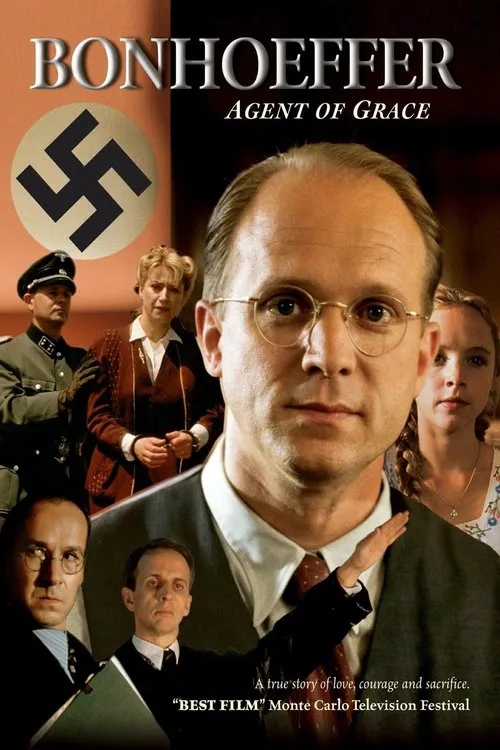Bonhoeffer: Agent of Grace

Plot
In the midst of war-torn Germany, a nation torn apart by the Nazi regime, Reverend Dietrich Bonhoeffer stood as a beacon of hope and morality. His unwavering dedication to his faith and conviction led him to take a bold stand against Adolf Hitler and the oppressive Nazi regime. Born in 1906, Bonhoeffer's life was one of intellectual curiosities and strong moral convictions. As he navigated the tumultuous landscape of World War II, his faith remained unshakeable, even as those around him began to compromise and conform to the Nazi ideology. Bonhoeffer's early years were marked by academic pursuits and a deep passion for philosophy and theology. His studies took him to England, where he attended the University of London and became acquainted with leading theologians of the time. His intellectual curiosity and faith would continue to guide him throughout his life, shaping his response to the growing menace of Nazi Germany. In the mid-1930s, Bonhoeffer returned to Germany, a country rapidly descending into chaos under Hitler's tyrannical rule. As the Nazi party tightened its grip on power, Bonhoeffer found himself increasingly at odds with the regime. His opposition was not solely driven by outrage at the atrocities committed by the Nazis, but by a deep sense of moral obligation to stand in defiance. "That question tormented Dietrich Bonhoeffer, a German clergyman of great distinction: what is a moral person to do in a time of savage immorality?" Bonhoeffer's early days in Germany were marked by quiet resistance, subtly rebuking the Nazi Party's ideology through his sermons and writings. His words carried weight, resonating with those within his community who, like him, felt trapped in a sea of morally gray areas. He often found himself navigating a delicate balance between speaking out against the regime and avoiding the risk of arrest and persecution. As the Nazi regime intensified its grip on Germany, Bonhoeffer's faith became the anchor that held him fast. He drew strength from his Christian conviction, which compelled him to act in the face of overwhelming opposition. He became increasingly associated with the German resistance, working closely with other like-minded individuals who shared his desire to overthrow the Nazi regime through peaceful means. In the late 1930s, Bonhoeffer became involved in a plan to overthrow Hitler through a military coup. This bold move was not without risk, as it directly challenged the Nazi regime's authority. Bonhoeffer's participation in the plot, however, was not driven by a desire for personal glory or power, but by a fervent sense of moral obligation. He and fellow plotters worked tirelessly, often in the shadows, to coordinate the plan. The failure of the plot in 1943 led to a drastic shift in Bonhoeffer's circumstances. He faced increased scrutiny from the Nazi authorities and was ultimately arrested in 1943. The years that followed were marked by imprisonment and eventual transfer to a concentration camp. Despite the bleak conditions and the ever-present threat of death, Bonhoeffer's faith remained a source of hope and sustenance. Bonhoeffer's time in prison and concentration camp was a period of profound spiritual growth. He poured his heart and soul into writing, crafting a powerful critique of Nazi theology and articulating his own vision of Christianity. His most famous work during this period, "The Cost of Discipleship," is a scathing indictment of the Nazi regime's warped ideology and a testament to the enduring power of Christian faith. Less than a month before the end of World War II, on April 9, 1945, Bonhoeffer was hanged by the Nazis, his body dumped into a mass grave with thousands of others. His sacrifice would not be in vain; it would ultimately galvanize efforts to uncover the stories of resistance and courage exhibited by individuals like Bonhoeffer during one of the darkest periods in human history. Through Bonhoeffer: Agent of Grace, we see the story of a man whose moral convictions cost him his life. A German clergyman of great distinction, Bonhoeffer's unwavering opposition to the Nazi regime serves as a beacon of hope and inspiration, even in the darkest of times. His legacy is a powerful reminder that, even when confronted with overwhelming opposition, one person can make a difference and that standing in defiance of moral compromise can be the most courageous act of all.
Reviews
Recommendations




